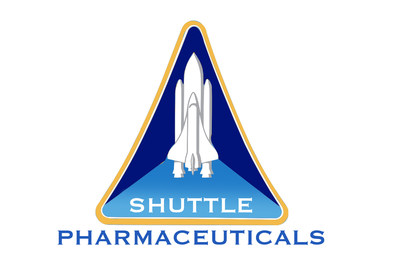Shuttle Pharmaceuticals Holdings, Inc. (Nasdaq: SHPH) today announced the publication of a manuscript reporting on the ability of Shuttle’s lead Histone deacetylase 6 (HDAC6) inhibitor drug candidate (SP-2-225) to stimulate the innate immune system following radiation therapy.
|
ROCKVILLE, Md., Aug. 29, 2023 /PRNewswire/ -- Shuttle Pharmaceuticals Holdings, Inc. (Nasdaq: SHPH), a discovery and development stage specialty pharmaceutical company focused on improving the outcomes of cancer patients treated with radiation therapy (RT), today announced the publication of a manuscript reporting on the ability of Shuttle's lead Histone deacetylase 6 (HDAC6) inhibitor drug candidate (SP-2-225) to stimulate the innate immune system following radiation therapy. The manuscript, titled "Radiation therapy-induced immune response enhanced by selective HDAC6 Inhibition," was reported by first author Dr. Satish Noonepalle, Assistant Professor at Georgetown University and the Lombardi Comprehensive Cancer Center, and published in Molecular Cancer Therapeutics, a scientific journal affiliated with the American Association for Cancer Research (AACR), the premier international cancer research society. "The report highlights to the scientific and financial community how our novel selective inhibitor (SP-2-225) is able to target the HDAC6 function in tumors to inhibit tumor growth and enhance the M1/M2 ratio of infiltrating macrophages within tumors as a combination therapy with RT," commented Anatoly Dritschilo, M.D., CEO of Shuttle Pharmaceuticals and a co-author of the report. "These observations support a strategy to advance the use of selective HDAC6 inhibitors to improve antitumor immune responses and prevent tumor relapse post-radiation therapy." RT is a curative cancer treatment modality that imparts damage to cellular DNA, induces immunogenic cell death, and activates antitumor immunity. Despite the RT-induced direct antitumor effect seen within the treated volume, accumulating evidence indicates activation of innate antitumor immunity. Acute proinflammatory responses mediated by anticancer M1 macrophages are observed in the immediate aftermath following RT. However, after a few days, these M1 macrophages are converted to anti-inflammatory and pro-cancer M2 phenotype, leading to cancer resistance and underlying potential tumor relapse. The study was supported by NIH grant R01CA249248, and Cancer Research Institute Grant #228514 to Dr. Alejandro Villagra, and HDAC6 inhibitor SP-2-225 was provided at no charge by Shuttle Pharmaceuticals, Inc. under a material transfer agreement. A copy of the publication is available at: https://pubmed.ncbi.nlm.nih.gov/37586844/ Molecular Cancer Therapeutics publishes translational research studies focused on the discovery and preclinical development of therapeutic agents for oncology. To reflect the evolving field of therapeutics, the journal's interest extends to all selective drugs including small molecule inhibitors, antibody-drug conjugates, antibody cytokine fusions, bispecific antibodies, cell therapies, gene therapies, radio-immunotherapeutics, vaccines, viral therapies, and other experimental approaches in oncology. About Shuttle Pharmaceuticals Founded in 2012 by faculty members of the Georgetown University Medical Center, Shuttle Pharmaceuticals is a discovery and development stage specialty pharmaceutical company focused on improving the outcomes for cancer patients treated with radiation therapy (RT). Our mission is to improve the lives of cancer patients by developing therapies that are designed to maximize the effectiveness of RT while limiting the side effects of radiation in cancer treatment. Although RT is a proven modality for treating cancers, by developing radiation sensitizers, we aim to increase cancer cure rates, prolong patient survival and improve quality of life when used as a primary treatment or in combination with surgery, chemotherapy and immunotherapy. For more information, please visit our website at www.shuttlepharma.com. Safe Harbor Statement Statements in this press release about future expectations, plans and prospects, as well as any other statements regarding matters that are not historical facts, may constitute "forward-looking statements." These statements include, but are not limited to, statements concerning the development of our company. The words "anticipate," "believe," "continue," "could," "estimate," "expect," "intend," "may," "plan," "potential," "predict," "project," "should," "target," "will," "would" and similar expressions are intended to identify forward-looking statements, although not all forward-looking statements contain these identifying words. Actual results may differ materially from those indicated by such forward-looking statements as a result of various important factors, including factors discussed in the "Risk Factors" section of Shuttle Pharma's Annual Report on Form 10-K for the year ended December 31, 2022, filed with the SEC on March 15, 2023, its Quarterly Reports on Form 10-Q for the periods ended March 31, 2023 and June 30, 2023, filed with the SEC on May 25, 2023 and August 14, 2023, respectively, as well as other SEC filings. Any forward-looking statements contained in this press release speak only as of the date hereof and, except as required by federal securities laws, Shuttle Pharmaceuticals specifically disclaims any obligation to update any forward-looking statement, whether as a result of new information, future events or otherwise. Shuttle Pharmaceuticals Investor Contacts
SOURCE Shuttle Pharmaceuticals Holdings, Inc. |
||
Company Codes: NASDAQ-NMS:SHPH |





